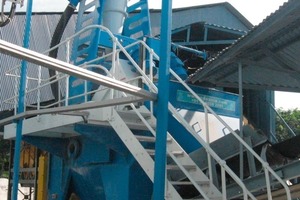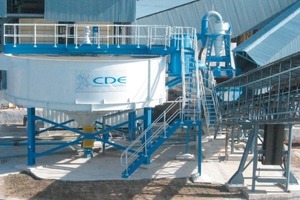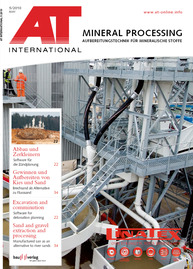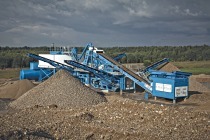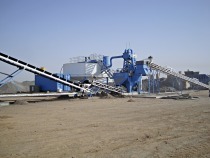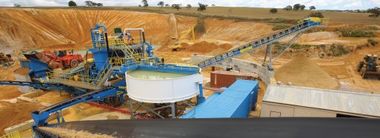Manufactured sand as an alternative to river sands
Much of the sand supplied to the market in the Kaliyal region of India has traditionally been dredged from rivers. With growing pressure to reduce the environmental impact of such activities and ever increasing legislation operators are now looking at alternative methods of production for the sand products required to meet the requirements of the planned infrastructure developments in the region.
One such company is Poabs Granite Products who have been operating in the quarrying sector since 1986. The company have recently installed a new 100 t/h sand washing plant (Fig. 1) from CDE’s Asian office with its headquarters in Kolkata. The plant was required by Poabs Granite in order to allow them to meet the growing demand for a manufactured sand product for use in concrete manufacture. Poabs previously operated an extensive crushing operation in Kaliyal and while this brought the stone size down to a manufactured sand specification the problem lay in the high percentage of material passing 150 µ. There are stringent limits set on the volume of material in this range that is permitted in concrete sand and this required that Poabs adapt their existing system to allow for the production of material which would allow the efficient production of a concrete sand product.
The Evowash system is a compact design incorporating a specialised rubber lined hydrocyclone, a high frequency dewatering screen and a recirculating slurry pump into a single system. The washed sand product is discharged at approximately 12 % moisture content which is significantly less than other sand washing systems available. This offers significant advantages for the customer as it means that the material is ready for market straight from the belts.
The unwanted fines are carried off from the Evowash system with the cyclone overflow. On many systems this waste material is simply sent to on site ponds or lagoons. The build up of material in these ponds adds additional costs to the operation of the plant as these need cleaned regularly resulting in plant downtime and lost production. Therefore Poabs Granite made it clear from the start that they were keen to look into the introduction of a primary stage water treatment system with the plant. Furthermore the company were also very keen to ensure that the environmental impact of the new plant was reduced as far as possible. CDE were able to meet the requirements of Poabs Granite in this instance through the introduction of their AquaCycle thickener system (Fig. 2). This system has been tried and tested on many of the CDE installations throughout Ireland, the UK, Europe and The Middle East as well as on many of the company’s iron ore washing plants in India and offers operators a means of significantly reducing both the volume of water required as part of the sand washing operation and the volume of waste material generated by the plant.
The AquaCycle model specified in this instance is the A400 which is capable of treating 400m3/h of slurried fines from the Evowash plant. The introduction of the system reduces the volume of fresh water required to feed the washing plant by 80-90 % – the specific figures for the Poabs plant show an 85 % reduction. As the slurried material enters the thickener tank a small amount of polymer flocculent is added. This forces the fines within the slurry to bind together and fall to the bottom of the AquaCycle tank. A set of rakes at the bottom of the tank feedback information on the sludge density to the plc control panel and provide a trigger for discharging the sludge to storage. Meanwhile, the clean water overflows the top of the AquaCycle tank before being sent to an AquaStore water recycling system where it is recirculated to the washing plant.
CDE Ireland Ltd., Cookstown (IRL),
Tel.: +44 28 8676 7900, www.cdeglobal.com

